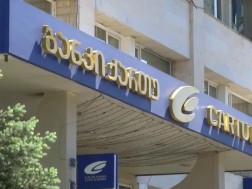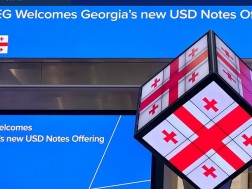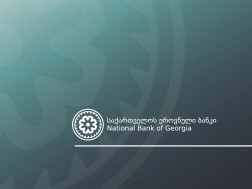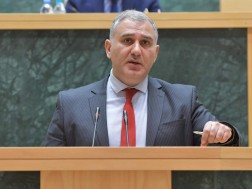
According to the statistics of the National Bank of Georgia, as of 01.02.2026, all banks are profitable, except for Silk Bank and the sanctioned VTB. If we do not include the loss-making Digital Hash and Pave banks (Paysera’s profit is 654,000 GEL).Silk Bank's loss has increased to 2.1 million GEL (L/Y - 1.5 million), which is related to the cost of developing digital channels. The loss of Russian VTB has decreased, to 7 million (01/2025 - 12.1 million).Both microbanks are profitable (MBC - 0.4 million; Crystal - 2.4 million).Among banks with large assets, Arab capital's "Tera", with a profit of 3 million, overtook German "ProCredit" (2.8 million). Georgian "Cartu" (1.09 million) lagged behind Kazakh "Halyk Bank" (1.95 million) and even Microbank.
1772455912

The transaction was completed on February 16, 2026, and was finalized in London.The 5.06% stake represents 1,759,924 voting shares, held by entities controlled by the Wellington group and through nominee shareholders. The nominee shareholders include VIDACOS Nominees Limited, Goldman Sachs International, and ROY Nominees Limited.Wellington Management Company LLP is an investment management entity that manages the assets of certain funds and/or managed accounts. Wellington Management Company LLP is a direct controlled undertaking of Wellington Investment Advisors Holdings LLP, which, in turn, is a direct controlled undertaking of Wellington Group Holdings LLP, which, in turn, is a direct controlled undertaking of Wellington Management Group LLP.
1771412288

According to the statistics of the National Bank of Georgia, the maximum share of transfers in January falls on the EU countries - 45.4%, with an annual growth of 17.5% (01/2025 - 45.09%, +7.5%Y.Y).Transfers from Spain increased by 41% year-on-year (Germany +24.6%Y.Y; Greece +18%Y.Y; Italy +15.2%Y.Y).Remittances from Russia are also increasing, with an annual growth of 32%, in contrast to last year's 63% decline. Russia will be eliminated in the donor ranking in December-January with increasing dynamics (12/2026 +39%Y.Y).
1771328675

According to G&T, the Z-spread of newly placed securities is currently 209.8 bps (basis point – %pX100).Investor sentiment and correspondingly high demand are maintained. With low debt, sufficient reserves and other macro parameters, the Georgian economy deserves confidence.5-year bonds were placed in January at 5.125%. The new issue refinanced the previous one.
1771328499

Lion Finance Group (BGEO LN) shares closed at GBP 97.00/share (-2.95% w/w and +3.74% m/m). More than 213k shares traded in the range of GBP 95.30 - 100.80/share. Average daily traded volume was 54k in the last 4 weeks. The volume of BGEO shares traded was at 0.49% of its capitalization.TBC Bank Group (TBCG LN) closed the week at GBP 42.50/share (-0.35% w/w and +8.42% m/m). More than 347k shares changed hands in the range of GBP 42.05 - 43.85/share. Average daily traded volume was 74k in the last 4 weeks. The volume of TBCG shares traded was at 0.62% of its capitalization.Georgia Capital (CGEO LN) shares closed at GBP 33.15/share (+1.84% w/w and +5.57% m/m). More than 331k shares traded in the range of GBP 32.35 - 34.75/share. Average daily traded volume was 61k in the last 4 weeks. The volume of CGEO shares traded was at 0.95% of its capitalization.
1771328270

The placement was conducted in the domestic market in accordance with local regulations. Although the subscription period was initially scheduled from 2 February 2026 to 29 May 2026, the offering has already been fully subscribed, demonstrating exceptionally strong investor demand.Key details of the Notes are as follows: Denomination: USD, with a face value of USD 10,000 per Note. Minimum Investment: A minimum purchase quantity of five (5) Notes. Term: The Notes are perpetual, with an option for the Bank to call them for early repayment after the fifth year. Coupon: An 8.5% coupon rate, payable semi-annually. Ameriabank CJSC acted as the arranger for the placement. The Notes are expected to be listed on the Armenia Securities Exchange.“The strong demand for our AT1 notes is a clear testament to the market’s trust in our credit story and disciplined balance sheet management. By enhancing our capital adequacy ratios, this transaction provides additional headroom to pursue our growth ambitions and reinforce our role as the largest lender to the Armenian economy”, - Hovhannes Toroyan, Ameriabank’s CFO, commented.“We are pleased to announce the successful placement of Ameriabank’s inaugural AT1 notes on the local market. The swift subscription underscores investor trust and is a testament to the strength of the Bank’s wealth management franchise and distribution capabilities. This issuance enables Ameriabank to create capital buffers, reinforcing its flexibility to pursue further growth and deliver on its strategic objectives”, - Archil Gachechiladze, Group CEO, said.
1771240188

The report reviews trends, strengths and weaknesses, key challenges, and macroeconomic risks in the banking sector of the Central Asia and Caucasus region. It gives particularly high marks to Georgia’s institutional framework, noting that banking regulation and supervision are among the most advanced in the region.According to S&P, Georgian banks have the best asset quality in the region, measured by the share of IFRS Stage 3 loans, while the cost of credit risk is minimal - thanks to a favorable macroeconomic environment and effective work by the National bank of Georgia (NBG) as the regulator. The report also highlights ongoing improvements in the governance of the National Bank.The agency expects Georgia, as a regional innovator, to further align its bank resolution framework with the EU Bank Recovery and Resolution Directive (BRRD).
1771240016

The National Agency for Promising Projects (NAPP) officially registered the issue on February 9, 2026.By the decision of the bank's shareholders on January 16, 2026 (quorum 100%), the new issue will be placed in the subsidiary TBC Digital, at a market nominal value of 1,000 soums per share.Payment will be made in cash in the national currency.The issue includes 240 million shares, which corresponds to a total issue amount of 240,000,000,000 soums.For reference, TBC Digital manages the digital business of TBC Bank Group PLC in Uzbekistan, which includes TBC Uzbekistan, the leading digital bank in Uzbekistan, Payme, a popular digital payments application, BILLZ, TBC Insurance, TBC Nasiya - an installment business, and other fast-growing digital services.At the current exchange rate of the Central Bank of Uzbekistan, $1 is equal to ≈ 12,287 UZS.Last year, TBC Uzbekistan issued soum-denominated securities twice. In February last year, TBC issued securities in the amount of 128 billion soums, with a 2-year maturity and a 24% interest rate. At the end of December, it placed bonds worth 49.6 billion soums ($4.1 million).
1770893858

According to the Pension Fund, 2026 started quite well for all portfolios of the Pension Fund, in which the dynamic portfolio traditionally led: Dynamic – 2.76% Balanced – 2.06% Conservative – 1.49% In addition, the dynamic portfolio has been leading in terms of annualized income since its creation (August 6, 2023), and its profitability is equal to 15%, while the corresponding indicators for the balanced and conservative portfolios are 13.5% and 12.1%.By the end of January, the assets of the Pension Fund of Georgia exceeded GEL 8.5 billion, and the generated profitability reached GEL 2.4 billion.The number of participants in the pension scheme is 1 million 715 thousand people.As of January 31, 2026, 27,643 people benefited from the funded pension, and 129,544,402.18 GEL was issued to them as pensions.
1770876069

As of January 2026, the overall price level in Georgia increased by 4.8 percent year-on-year. Higher-than-targeted inflation continues to be largely driven by food price inflation. In particular, rising prices on international markets for certain commodity groups on international markets, which have a substantial weight in Georgia’s consumer basket, are being transmitted to the domestic market. On the other hand, alongside external factors, one-off price adjustments for certain domestic products and volatility in agricultural product prices are also putting upward pressure on inflation. At the same time, core inflation, excluding food, energy, and tobacco from the headline, remains close to the target (2.1 percent in January), indicating the stability of long-term inflation expectations. Service sector inflation, characterized by relatively sticky price adjustments, increased slightly in January, reaching 3 percent. Accordingly, measures of sticky price indices indicate that inflationary pressures remain less broad-based. However the moderate month-of-month increase in sticky price inflation heightens the risks of upward shift in inflation expectations. Against this backdrop, according to the NBG's updated central scenario, the inflation forecast for 2026 has been revised slightly upward. Under the central scenario, the current inflation dynamics are still assessed as temporary and are not expected to generate ‘second-round’ effects, implying that price pressures are not spilling over to other goods and services. Accordingly, other things being equal, as the effects of temporary factors subside, inflation is expected to gradually converge toward the target rate from the second quarter of 2026, averaging 3.7 percent over the year.Economic activity is gradually converging toward its long-term growth rate, easing the demand-side pressures on prices. In particular, according to the NBG's updated central scenario, economic growth is projected at 5 percent in 2026. The normalization of the economic growth will be further supported by maintaining credit activity close to its equilibrium level.Given the high uncertainty, upside risks to inflation are more pronounced, while downside risks continue to remain. Accordingly, the Monetary Policy Committee (MPC) considered both high-inflation and low-inflation risk scenarios, along with the central scenario, and the risks operating in different directions were taken into account in the decision-making process.Under the realization of the high-inflation risk scenario, fundamental economic processes would require a higher trajectory for the monetary policy rate compared with the central scenario. Specifically, in January, the moderate increase in sticky price indicators compared with previous months heightens the risks of an an increase in long-term inflation expectations. At the same time, sustaining a high level of economic activity, amid normalizing growth in high-productive sectors, is expected to put additional pressure on inflation. Under this scenario, an escalation of the global geopolitical situation could lead to higher-than-expected price increases on international commodity markets, which would also be transmitted to the domestic market.On the other hand, under the low-inflation risk scenario considered by the MPC, the realization of the risks would allow a faster reduction in the policy rate compared with the central scenario. Specifically, sustaining high growth rates in high-productive sectors could accelerate the potential growth. In this case, a strengthening of the supply side would have a disinflationary effect, allowing inflation to converge toward the target more rapidly than under the central scenario. Meanwhile, at this stage, developments in the domestic labor market are exerting downward pressure on prices, supporting the likelihood of a low-inflation scenario. Among external factors, a prolonged period of a weak position of the U.S. dollar, together with declining oil prices in international markets, would put downward pressure on headline inflation.As a result of macroeconomic analysis and the assessment of the aforementioned scenarios, the MPC has considered it optimal to maintain a moderately tight monetary policy stance and kept the policy rate unchanged at 8 percent. Upcoming decisions on the monetary policy rate will depend on updated data and the realization of risks. According to the central scenario, the NBG will continue the normalization of monetary policy only after the current one-off factors have been fully dissipated and inflation converges the target level. However, should inflation persist above the target for an extended period due to various one-off factors, the MPC stands ready to maintain the current tight stance for longer than expected and, if necessary, to tighten it further.The NBG will use all available instruments to maintain price stability. This means keeping the overall price level increase close to the 3 percent target over the medium term.The next meeting of the Monetary Policy Committee will be held on March 25, 2026.
1770812215
Health Ministry specifies the criteria for verifying socially vulnerab...
1771588337
Georgia Issues Residence Permits to 107,307 Foreigners – Kobakhidze Pu...
1771412692
Yandex Eats Exits Georgian Market
1771412004
Record Year for Georgia’s Real Estate Market: $4.3 Billion in Apartmen...
1771410233
Prices of industrial products produced for the local market increased...
1771588217






